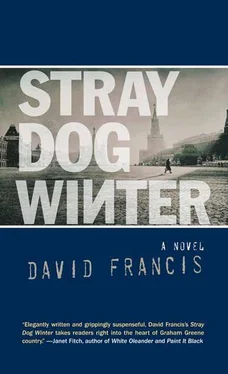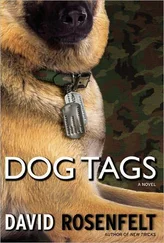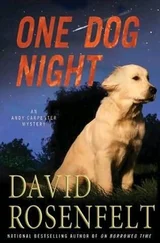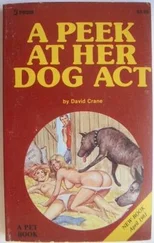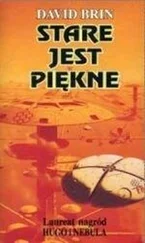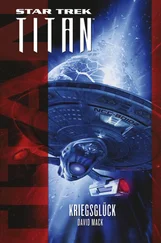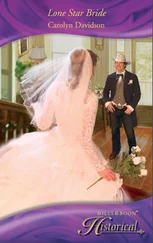Dully, he hummed out loud and then she looked up with an artificial calm. Tilda, he said, the name of the baby his mother had lost. He held up the document but Fin never saw it, she only saw him as she ran to the next room and Darcy heard shouting inside and a rush through the woods as he flung himself down deep under the eaves of the window, alongside the house; among the wet stove wood, he lay like he was dead already as the waves crashed around him and nothing to be done save listen to the gunshots and running, someone rushing for him. Give it to me, the Turk grabbing at him then bullets splintered on the boards above, shattering the window, the Turk on all fours like a beast beside him, and then face down and glass on Darcy’s legs. Darcy’s face bandaged in the crusted snow, the document held like a biblical thing, his eyes tight, sinking, imagining Fin tearing through black pines, feeding herself to the frozen river. Come to Moscow, she’d said, it’ll be fun, but she’d fallen in love with a savage and Darcy, drowning, reduced to a hum.
Moskva River
Sunday, 8.20 pm
There were no more shots, just cries in the night from the direction
There were no more shots, just cries in the night from the direction of the river. A figure disappeared around the house into darkness and Darcy scrambled up blind among the snowy logs, so numb with cold and not even sure if he was wounded. More shouts and he kneeled. The Turk face down in the dark beside him, he didn’t dare kick him to see if he was dead, just felt the document inside his own wet coat, and then he was running back through the firs, away from the hut, stumbling through the black underbrush, back towards Aurelio. More gunfire behind him, the pine branches whipping his face, and he imagined Fin somewhere down near the river, scooting across the ice, covering ground on her elbows like one of those frogs that run across water, or laid out on the edge, riddled with bullets, the general inspecting his kill.
Darcy felt feverish, heaving for air at the sight of the Lada, its parking-light eyes shining orange. But the general was here—he leaned against the car smoking in a black velvet overcoat, a dress coat. No shape of Aurelio in the car. Run, thought Darcy, turning back to the forest, but the general was opening the driver’s side door. You will drive us back, he said, waving a pistol produced from a holster under his coat. You can trust me, he said. I take you to a nice place now.
Where’s Aurelio? asked Darcy, his voice faraway.
He is better now, the general nodded, and waved the pistol.
Get in.
But Darcy didn’t move. What have you done? he asked. I deal with him, send him out into the night, said the general,
like I deal with Tugrul, like my men are doing with your Armenians. He fired a silenced shot into the grey-black snow near Darcy’s feet. Like I can deal with you.
Darcy approached the car slowly, doubting his will to survive, if he should just turn back into the gun-yielding trees and receive the shot in the back, fall face down and be gone like the Turk, or just die of exposure on his own, out where the dogs barked. But he got in the Lada and sat where he’d last seen Aurelio, the general resting the gun against the velvet of his coat, the tinny smell of a weapon just fired. Opera on the radio. The heater. As if civilised. Darcy didn’t flinch as the general reached over into his wet coat pocket for the plastic bag.
He try to take this from you, said the general. Now he is dead. He placed the document inside his own fresh coat.
Darcy fixed on the narrow track that appeared in the car lights, looking for eyes in the night, for witnesses, but there were just shadows and blackness. He changed roughly through the Lada’s gears, drove where Aurelio had driven, trying to the fight the blur of tears and his imaginings—Aurelio out in the splintering night, the blood from his cuts, from his mouth, run thin.
What did you do to him? asked Darcy, his voice hardly his own.
He has been digging his own grave, the general said. Digging your graves, all of you. His calm had a shiver that ran through Darcy, a calm that filtered psychosis, and the flourish of horns and operatic voices from the radio. That he dared listen to music. But as the general tapped his cigarette ash onto the floor he looked away, and Darcy thought he saw the slightest shake in the leathergloved hand. A hand like a black claw that now rested on Darcy’s leg, smoke curling from it, and Darcy imagined accelerating off into the tree trunks, their heads dashed against glass. He tried to ingest the warm tobacco air but all he could feel was an animal panic. Then, at the main road, the general directed him, the pistol like a wand, back towards the city. And now all Darcy saw in the gliding darkness was the light that had left Aurelio’s eyes. You killed him, he said.
The general emerged from some reverie. You do not know that, he said.
Darcy looked out at the half-lit factories, then down at the gun, the way it was pointed at him. He is your son, he said.
The general nodded resignedly. But he was not a man, he said. I could not trust him. He gestured with the weapon for Darcy to turn from the river and pointed up a narrow street, carved between cedars, an area of compounds.
We have invitation, he said, but Darcy didn’t believe him, wondering if he could slide the car off the road and turn it over without being killed. But he was halted by a guard who appeared from a booth between stone gateposts and the general leaned forward in the torchlight to be recognised. The Lada was saluted through.
Someone wanting to meet you, said the general.
But it didn’t make sense, everything short-circuiting: Aurelio abandoned out in the night and a driveway opening up to a pale two-storey mansion. A lantern by the door threw a triangle of light on the walls like a Magritte and Darcy recognised it from the photo, the garden now in winter, the stones clawed with deciduous ivy in the dark. In the general’s photo Anyetta Chernenko had stood on the lawn. And Darcy in this car with the general, fresh from his Black Sea honeymoon, his new wife nowhere to be seen, untouched by his newly dead son. Talk, thought Darcy, make yourself seem human.
What do you want from me? he asked.
Just be polite, he said. She is my friend. Wanting to meet with the artist. He checked himself in the rear-view mirror, removed his hat and pushed his hand through his buzz of white hairs. Darcy stopped the Lada without the handbrake, let the tyres lodge in the slough, and he stared out in the way he’d learned when his mother was drunk, when dealing with someone irrational, but it hadn’t equipped him for this. Did you never love Aurelio? he asked.
The general reached for the keys and placed them in his pocket. You do not know that either, he said, magnanimous, perverse, and with his gun he motioned Darcy into the cold and Darcy wondered fearfully what he was being spared for. He opened the door to a narrow avenue of poplars, trimmed as thin as pencils, and for a moment Darcy hoped he’d be sent in alone, to knock on the door like a soldier returned from the trenches, the lapels of his coat and the knees of his jeans wet with snow, to take refuge in a woman’s face. Maybe Fin by the fire, wrapped in a mohair blanket—perhaps it was all a surprise. The panelled door opening, a tall figure silhouetted and the whippet bounding down. Darcy knelt to nuzzle its warmth against his hands and it pushed its face against him like a cat might. The general strode past and was ushered inside by the widow.
Darcy looked up at her waiting for him in the chill of the threshold, in the same evening gown and a silver fox stole, her eye shadow Elizabeth Taylor blue. Can you help me? he whispered, but she bent her head towards him puzzled, not hearing, not wanting to, as they both watched the dog lift a leg in the snow.
Читать дальше
